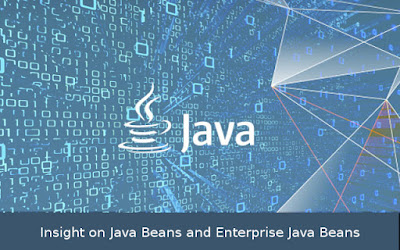Java
is the most trusted and tested technology of the industry. It has been
ruling the industry for more than two decades. This is because of the
versatile nature of Java. Java developers can develop any type of
application like hardware programming, desktop application development,
web development, game development or even smart phone app development.
Moreover Java is platform independent in nature i.e., we can run it on
any platform. Hence there is a tremendous demand of Java developer in
the industry. With time Java has modified itself to meet the expectation
of the industry and hence it has been treated as the evergreen
technology of the industry. To make the things seamless, there are many
Java frameworks that help Java developers in building enterprise
standard software applications for different domains. Today we will
discuss to measure components of Java i.e., Java beans and enterprise
Java beans.
Java beans: Java
beans are classes that encapsulate a number of objects into a single
bean. Usually it has two methods i.e., getter and setter methods.
Through these two methods, we can interact with different events and
properties of the application to give it an interactive look and feel.
Through getter we can get some value from the application and with
setter we can set it to the Java beans and then we can use it in the
application. We can customise the user interface of the application
through the Java bean without any hassle. We can also change different
property values of the application for improve user experience. Well the
Java bean is like a blank paper and it can be reusable in the
application as a component.
Enterprise Java Beans: Enterprise
Java beans are just like the Java beans with some additional features
to make the development process of a higher standard. It is helpful in
developing business standard Java applications. It is a server side
component to encapsulate the business logic of a specific application.
It helps in transition processing, concurrency control, asynchronous
method calling, job scheduling and deployment of software components in
server side etc. It has received a tremendous support and popularity
from the industry in very less span of time due to its magical essence.
Well it is just like Java beans along with an additional method i.e., a
public constructor. This helps in developing highly optimised and
efficient Java applications. Let us discuss few differences between Java
beans and enterprise Java beans for better understanding in short.
Difference between Java Beans and EJB: EJB
is always a remote object and it is invisible. On the other hand Java
beans may or may not be visible depending upon the requirement of Java
developers. Though Java beans can also be implemented in server side but
it is always efficient to be implemented on client side only by the
Java developers. On the other hand EJB is more powerful in handling
server side components. Well Java beans does not have any types whereas
enterprise Java beans are of two types i.e., entity beans and session
beans. EJB may be transitional but Java beans don’t support transitions.
Hence we can say Java beans is for customising user objects in local
where as EJB is for high standard Java applications that needs server
side customisation with more power and efficiency.
Mindfire Solutions has been providing Java development services to its esteemed clients for over 15 years now. If you are exploring about outsourcing Java development Services or hire Java developers, please feel free to get in touch with Mindfire Solutions now and you can avail the limited period Risk-Free Trial Offer.

